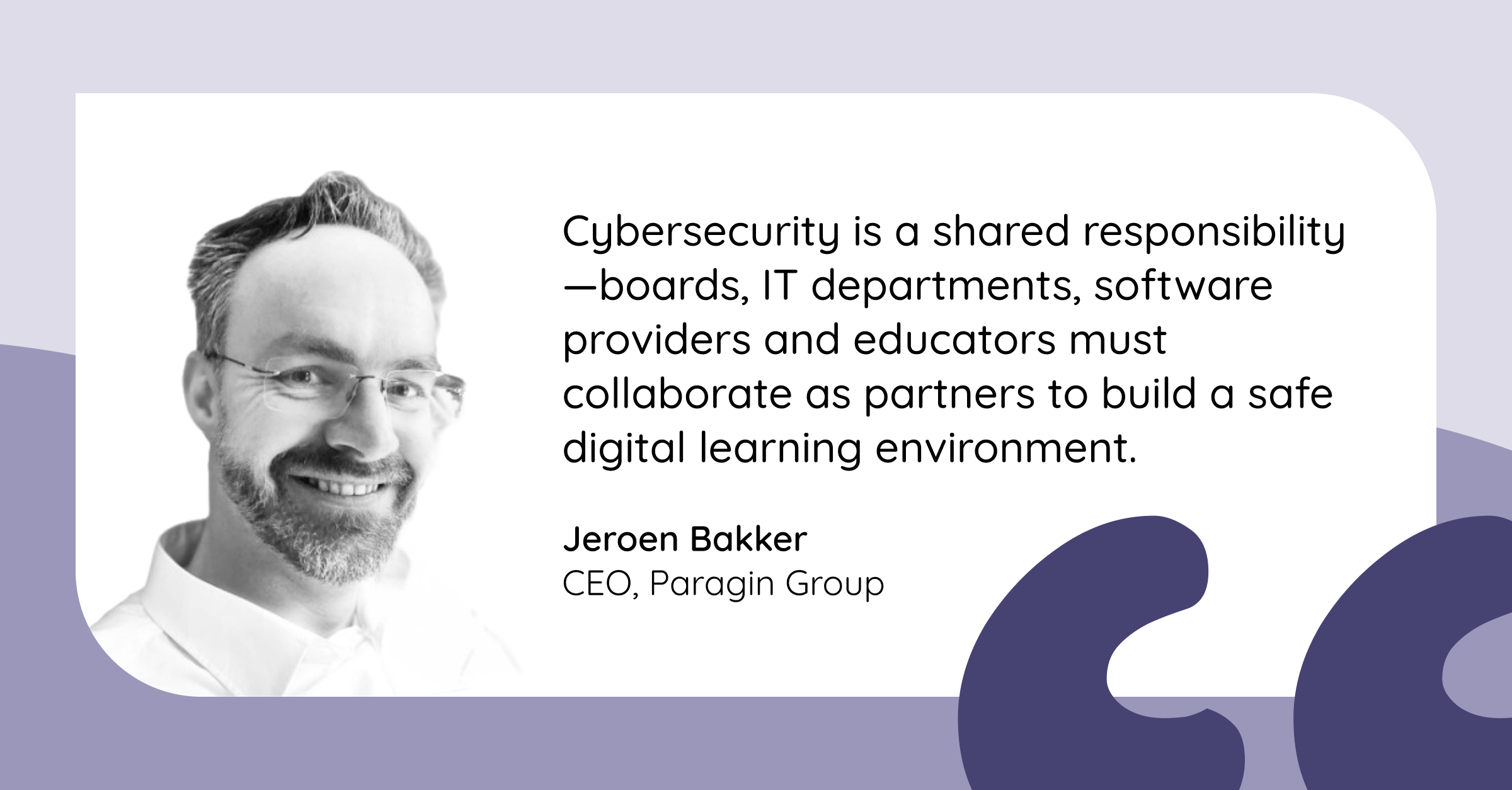Gemeinsame Verantwortung stärkt digitale Bildungssicherheit. Entdecken Sie, wie Paragin Vertrauen, Bewusstsein und sichere Lernumgebungen fördert.
October 29, 2025

Dieser Monat ist der Monat des Cybersicherheitsbewusstseins, und das Thema für 2025 lautet „Bleiben Sie online sicher“. In der Bildung ist dies nicht nur ein Luxus, sondern eine Notwendigkeit. Schüler und Lehrer müssen in der Lage sein, nahtlos zu lernen, Prüfungen abzulegen und zusammenzuarbeiten, ohne sich Gedanken über den Datenschutz und die Sicherheit ihrer Daten machen zu müssen. Um dies zu erreichen, ist ein Bewusstsein für Technologie, Prozesse und menschliches Verhalten erforderlich.
Sicherheit basiert auf Vertrauen: Können Sie sicher sein, dass Daten korrekt und präzise verarbeitet werden und immer verfügbar sind und gleichzeitig vor Missbrauch geschützt sind? Wird der Zugriff ordnungsgemäß verwaltet und können Vorfälle zurückverfolgt werden? Aus diesem Grund sind wir nach ISO 27001 zertifiziert. Wir setzen uns dafür ein, dieses Vertrauen kontinuierlich zu stärken, von der Risikobewertung bis hin zum Änderungsmanagement. Studierende, Pädagogen, Verlage, Prüfungsanbieter und Bildungseinrichtungen müssen sich sowohl auf unsere Software als auch auf unser Unternehmen verlassen können. Digitale Sicherheit ist nicht nur ein Produkt, das Sie kaufen, sondern eine Verpflichtung, die täglich eingehalten wird.
Das diesjährige Thema konzentriert sich auf vier alltägliche Maßnahmen, die einen großen Unterschied machen können: die Verwendung sicherer Passwörter mit einem Passwort-Manager, die Aktivierung der Multifaktor-Authentifizierung (MFA) für kritische Anwendungen, die Erkennung und Meldung von Phishing-Versuchen und die Aktualisierung der Systeme, um bekannte Sicherheitslücken zu schließen. Bei diesen Maßnahmen handelt es sich nicht nur um Checklisten — sie sollten zur täglichen Gewohnheit werden.
Cybersicherheit ist eine gemeinsame Verantwortung. Vorstände, IT-Abteilungen, Softwareanbieter, Pädagogen und Studierende müssen als Partner zusammenarbeiten. Diese Zusammenarbeit beinhaltet klare Vereinbarungen über den Zugriff auf und die gemeinsame Nutzung von Daten, gemeinsame Tests der Sicherungs- und Wiederherstellungsverfahren sowie einheitliche Eskalationswege, wenn etwas Verdächtiges passiert. Nur dann kann eine wirklich sichere digitale Bildungsinfrastruktur existieren.
Bewusstsein ist wertvoll, aber Verhaltensänderungen sind entscheidend. Deshalb sind unsere Produkte wie Skillsly, Remindo und OnStage so konzipiert, dass sie sicheres Verhalten durch durchdachte Benutzererlebnisse fördern. Dazu gehören das standardmäßige MFA-Angebot, das Verwarnen oder Blockieren schwacher Passwörter, die regelmäßige Überprüfung von Anmeldesitzungen, die Bereitstellung von Audit-Trails mit unveränderlichen Protokollen, kontinuierliche Überwachung mit aktiven Warnmeldungen und redundante Infrastruktur. Diese Funktionen machen es einfacher, die richtigen Maßnahmen zu ergreifen.
Wir legen großen Wert darauf, weil Bildung auf Vertrauen basiert: Wir stellen sicher, dass die Prüfungsergebnisse fair sind, die Portfolios privat bleiben und die Systeme verfügbar sind, wenn die Nachfrage am höchsten ist. Dieses Vertrauen hängt von der Disziplin bei kleinen Aktionen ab, die Tag für Tag durchgeführt werden. Lassen Sie uns also gemeinsam Verantwortung übernehmen: Aktivieren Sie MFA, verwenden Sie einen Passwort-Manager, melden Sie verdächtige Nachrichten und aktualisieren Sie Ihre Systeme unverzüglich. Auf diese Weise lernen wir offen, bewerten fair und schützen unsere Daten.